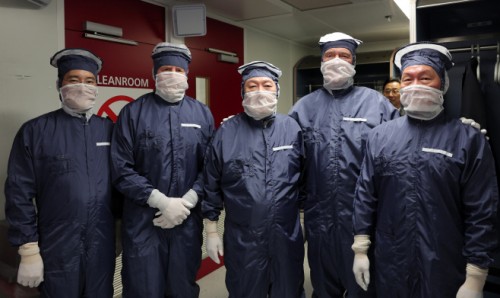 |
| President Yoon Suk-yeol visits ASML headquarters. (From left) Samsung Electronics Chairman Lee Jae-yong, Dutch King Willem-Alexander, South Korean President Yoon Suk-yeol, ASML chief Peter Wennink and SK Group Chairman Chey Tae-won wear anti-dist garments as they tour a “cleanroom” manufacturing facility at the ASML headquarters in Veldhoven, Netherlands, on Dec. 12, 2023./ Source: Yonhap News |
By AsiaToday reporter Hong Sun-mi
President Yoon Suk-yeol’s state visit to the Netherlands is expected to mark a new turning point in the South Korean chip industry as the semiconductor cooperation between the two countries will be upgraded to a semiconductor alliance.
As South Korea supplies 60 percent of the world’s memory chips and the Netherlands is unrivaled in the production of advanced semiconductor equipment, the alliance between the two nations is expected to bring a win-win situation for both countries that will further solidify the leading position in chip production and equipment in the world. It will also create synergy in taking the lead in advanced semiconductors that are essential for future emerging technologies such as AI and Quantum.
Yoon has vowed to enhance direct communication between the governments of South Korea and the Netherlands and provide all necessary support to ensure the success of semiconductor cooperation projects, during a business meeting held at the headquarters of leading chip manufacturer ASML in Veldhoven, Netherlands, on Tuesday.
Yoon expressed hope that the semiconductor alliance between the two countries will continue to strengthen. He asked ASML President and CEO Peter Wennink to closely cooperate with South Korean businesses to promote innovation in the chip industry and stabilize the global supply chain. The meeting was accompanied by Dutch King Willem-Alexander, Samsung Electronics Executive Chairman Lee Jae-yong, and SK Chairman Chey Tae-won.
“The technological innovation led by ASML is becoming a powerful driving force of the fourth industrial revolution around the world,” Yoon said. “We are grateful that Dutch semiconductor companies such as ASML and ASM have expanded their investments in South Korea by building new facilities for production, research and development, and training talent,” he said.
ASML also expressed its willingness to strengthen cooperation in semiconductors with South Korea by signing MOUs with its biggest customers Samsung Electronics and SK Hynix, and unveiling its “cleanroom” manufacturing facility for next-generation EUV equipment of less than 2 nm that has not been commercialized to President Yoon for the first time.
Samsung Electronics and ASML signed a memorandum of understanding (MOU) on jointly investing 1 trillion won (US$761 million) in establishing an R&D center in South Korea to develop next-generation chipmaking technology.
“The MOU has great symbolic significance as the first R&D center to be established overseas by ASML and a semiconductor company,” Park Chun-seop, presidential senior secretary for economic affairs, said in a media briefing. “The South Korean government plans to fully support from installation to operation process,” Park said.
Separately, SK Hynix signed an MOU with ASML to jointly develop technology to recycle hydrogen gas used to manufacture EUV machines. Hydrogen gas recycling is estimated to reduce power consumption per EUV unit by 20 percent and cut the relevant costs by 16.5 billion a year.
The two governments also signed an MOU to foster future chip talents together by jointly establishing a high-tech semiconductor academy.
#Yoon Suk-yeol #Netherlands #chip #semiconductor alliance #Samsung Electronics
Copyright by Asiatoday
Most Read
-
1
-
2
-
3
-
4
-
5
-
6
-
7





















